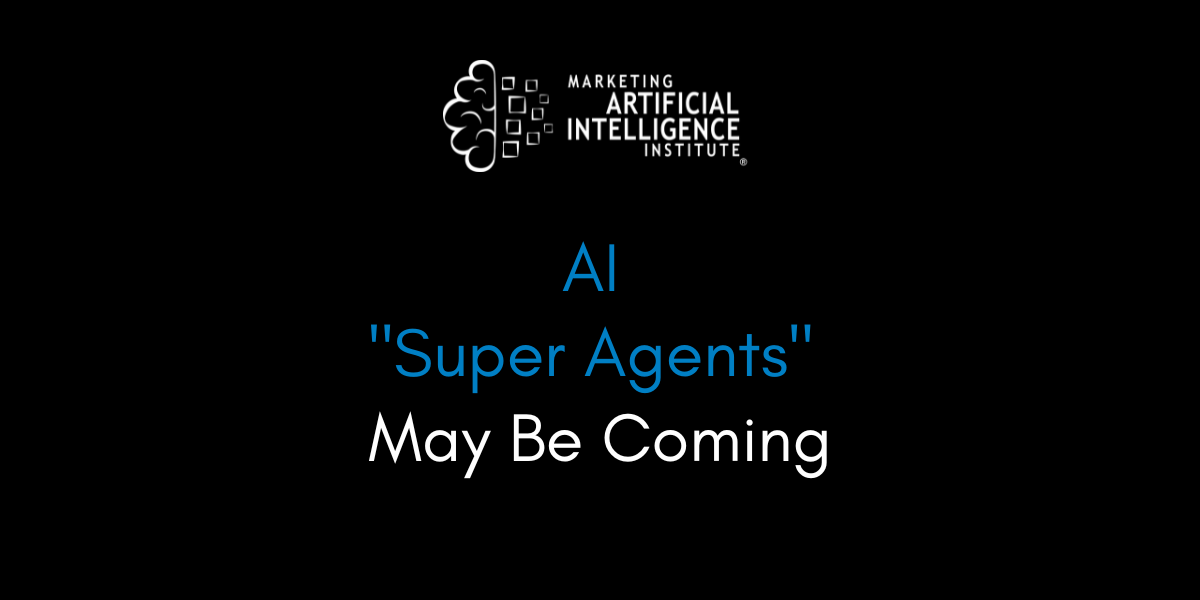Ph.D-level “super agents” that can replace mid-level engineers and other professional roles? That’s the bold rumor swirling around AI’s insider circles this week—and it’s sending the internet into a frenzy.
Axios kicked things off by reporting that a top AI lab might soon announce a breakthrough that unleashes agents capable of complex human tasks.
Meanwhile, OpenAI CEO Sam Altman has sparked fresh hype by teasing a new o3-Mini model—and scheduling a January 30th closed-door briefing for lawmakers in Washington.
Is this for real? Or is the hype about “super agents” getting way ahead of itself?
To sort through the noise, I talked with Marketing AI Institute founder and CEO Paul Roetzer on Episode 131 of The Artificial Intelligence Show.
The Breaking Report: “Ph.D-Level Super Agents”
Axios claims “architects of the leading generative AI models” are buzzing that “a top company”—possibly OpenAI—will debut a major breakthrough “in the coming weeks.” That debut supposedly “unleashes PhD-level super agents to do complex human tasks.”
Axios doesn’t confirm this is OpenAI for sure. But they do mention:
- Altman’s January 30th closed-door briefing with the U.S. government.
- Ongoing chatter from industry heavyweights (like Meta’s Mark Zuckerberg) about AI replacing mid-level software engineers.
Putting two and two together, many are speculating we’ll see a blockbuster announcement—and soon.
Meanwhile, Altman Confirms o3-Mini
The Axios report comes on the heels of Sam Altman’s own announcements on social media:
- o3-Mini is finalized and will be released in a couple weeks.
- It’s “significantly faster” than o1 Pro (though not as capable).
- It’ll launch in both API form and ChatGPT at the same time.
Altman also teased o3 Pro—suggesting even more powerful capabilities on the horizon.
Is This “Super Agents” or Something Else?
Roetzer believes the rumored “super agents” might be connected to the same developments powering the o3 line of models. Test-time compute, or giving the models more time to think, boosts their reasoning abilities.
In other words, even if you don’t train a model on a mountain of new data, allowing it to reason more deeply at inference can multiply its problem-solving capabilities dramatically. That could lead to “Ph.D-level” performance on highly specialized tasks.
“It’s likely test-time compute that they’re seeing accelerating," says Roetzer, which is spawning this type of hype.
The Online Hype—and Reality Check
Of course, whenever big AI rumors make headlines, online mania erupts.
Shortly after the Axios piece dropped, speculation ran wild that Altman might unveil genuine AGI to lawmakers during the meeting on January 30. Altman himself took to X to downplay that:
twitter hype is out of control again.
— Sam Altman (@sama) January 20, 2025
we are not gonna deploy AGI next month, nor have we built it.
we have some very cool stuff for you but pls chill and cut your expectations 100x!
Translation? Yes, things are advancing fast. No, we’re probably not on the verge of instantly unleashing superintelligence next week.
The Paul Schrader Moment: Why This Matters
Whether you call them “super agents” or “Ph.D-level,” what truly matters is how AI’s capabilities feel to experts on the ground.
Case in point: Legendary screenwriter Paul Schrader (co-writer of Taxi Driver and Raging Bull) recently declared on Facebook: “I’ve come to realize AI is smarter than I am, has better ideas, has more efficient ways to execute them. This is an existential moment.”
He reached that conclusion after prompting AI for script concepts—and finding them superior to his own.
It can be hard to "feel the AGI" until you see an AI surpass top humans in a domain you care deeply about. Competitive coders will feel it within a couple years. Paul is early but I think writers will feel it too. Everyone will have their Lee Sedol moment at a different time. https://t.co/Sfi1IZOGSd
— Noam Brown (@polynoamial) January 19, 2025
And there's a big lesson in here for everyone else who isn't a famous screenwriter, says Roetzer.
"Forget about all these evaluations these research labs talk about. Is it Ph.D level in math? And is it Ph.D level in biology? Who cares? What matters is that Paul Schrader, a legendary screenwriter, now believes the thing is better at his job than him. That's what matters, is when it starts to affect our jobs."
So, What Exactly Might We See Next?
While it’s unlikely Altman will waltz into Congress on January 30th and unveil AGI, something big is brewing:
- o3-Mini is just weeks away—faster than older models, with strong reasoning skills.
- o3 Pro is rumored to be even more capable, and could push the envelope further on AI’s ability to solve complex tasks.
- Agents (autonomous or semi-autonomous AI that can plan and act on user goals) continue to evolve, fueled by more advanced “test time compute.”
Put it all together and you get…
An era where professional-level AI workers might be a monthly subscription away.
The speed of these breakthroughs is already unnerving seasoned pros, from coders to screenwriters. So whether you think “PhD-level super agents” is a gimmicky headline or an impending reality, one fact remains:
We’re inching ever closer to AI systems that handle increasingly complex human-level tasks—maybe sooner than any of us think.
Mike Kaput
As Chief Content Officer, Mike Kaput uses content marketing, marketing strategy, and marketing technology to grow and scale traffic, leads, and revenue for Marketing AI Institute. Mike is the co-author of Marketing Artificial Intelligence: AI, Marketing and the Future of Business (Matt Holt Books, 2022). See Mike's full bio.



